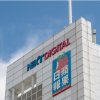- Date
- 30 June 2021
Analysis Of The Week: An Apple a Day No More?
Analysis Of The Week: An Apple a Day No More?
By Alison Catchpole |
The Story
On 23 June 2021, almost exactly a year after the introduction of the Hong Kong National Security Law (NSL), Hong Kong’s most vocal pro-democracy newspaper, the 26-year-old Apple Daily, printed its final edition (BBC). Within hours, the tabloid’s website was shut and all social media platforms erased.
Hong Kong cyber activists used censorship-proof blockchain platforms in a rush to back up the Apple Daily articles (Reuters). Less than a week earlier, a raid by over 500 armed officers had resulted in the arrest of five executives, frozen accounts, and accusations of foreign collusion. The tabloid had intended to keep printing until Saturday 26 June, but when news came of the lead columnist’s arrest, the board took the decision to close. One million copies rolled off the presses, more than ten times the usual print run, for a city of seven and a half million residents (Reuters).
There was vocal international concern, with UK Foreign Secretary Dominic Raab referring to the controversial NSL in a tweet. “The forced closure of @AppleDaily_HK by Hong Kong authorities is a chilling demonstration of their campaign to silence all opposition voices. It is clearer than ever that the NSL is being used to curtail freedom & punish dissent” (Twitter). US President Joe Biden called on the government to release staff, referring to “intensifying repression by Beijing” (Reuters) while UN Human Rights Commissioner Michelle Bachelet noted that Beijing’s crackdown is “leading journalists to increasingly self-censor” (Financial Times).
The Background
Apple Daily’s parent company Next Digital is the largest listed media company in Hong Kong, with just over 2000 employees. Its founder (and 71% shareholder), 73-year-old media tycoon Jimmy Lai, has been in jail since December for allegedly taking part in unauthorised rallies. Arrested in August 2020, he faces further NSL charges including conspiracy to collude with foreign forces, which could carry a life sentence.
Pro-democracy demonstrations engulfed Hong Kong in 2019, triggered by Beijing’s announcement of an extradition bill. This was later withdrawn but the sweeping NSL was brought in in 2020, enabling Hong Kong’s Chief Executive Carrie Lam and her government to request the blocking or removal of content it deems secessionist, subversive or treasonous. There have been mass arrests of political activists, and targeting of anyone seen as disloyal to Beijing, including judges and schoolteachers (Financial Times). Apple Daily’s arrests were under the NSL provision of “colluding with a foreign country or with external elements to endanger national security” (Reuters).
What It Means For Businesses And Law Firms
Law firms have had some time to reflect on the NSL, though not its full impact. In January, the Financial Times reported that large international corporations were considering excluding Hong Kong from legal contracts. The tightening grip of Beijing was seen as a possible threat to the rule of law, including ‘governing law’ and ‘arbitration’ clauses. Law firms exiting since 2020 include Stephenson Harwood and Vinson & Elkins (V&E) from Beijing, while V&E, Orrick, Osborne Clarke, and Locke Lord pulled out of Hong Kong (Law.Asia).
For decades, Hong Kong has been a critical hub for foreign businesses looking to engage with China but wishing to avoid the rigorous restrictions of the mainland. However, the American Chamber of Commerce found that more than 40% of expats they surveyed recently were considering moving away from Hong Kong (CNN). The closure of Apple Daily, coupled with the promotion of two officials by Beijing, makes business – particularly for tech, media and banks – difficult. As of 25 June, for the first time since the 1997 handover, a security specialist is in the number two position: Hong Kong's security secretary John Lee was appointed Chief Secretary.
China’s might continues to cause unease, with journalists anticipating “a further crackdown” (The Guardian). In 2020, the New York Times moved its Asian digital news operation from Hong Kong to Seoul.
Apple Daily’s final edition carried a farewell letter. “When an apple is buried beneath the soil, its seed will become a tree filled with bigger and more beautiful apples. Love you all forever, love Hong Kong forever.”
Image Credit: Yu Chun Christopher Wong / Shutterstock.com

